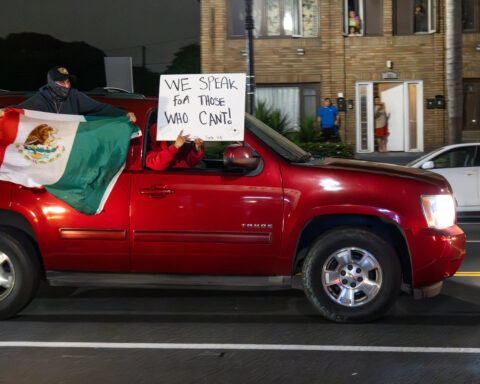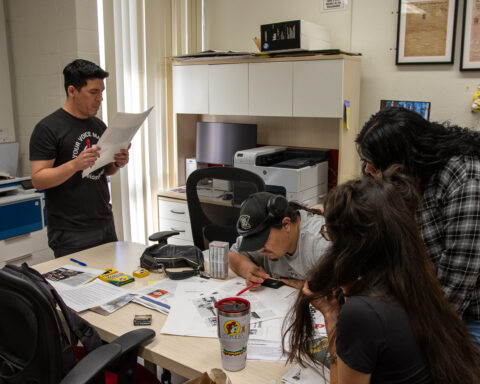— Additional reporting by Alessandra Gonzalez
Abortion rights divide Americans while State fends off legislative maneuvers.
A pro-life advocate circles the roundabout and lets loose a stream of obscenities from his car.
Waving a sign that reads “Keep the government out of my uterus,” pro-choice activist Kim Salter thrives on the honks and jeers from passing motorists in Old Towne Orange.
Despite the dissenters, whom Salter says are a rarity, she recognizes the increasing pro-life support nationally.
“We fought so hard to get Roe passed, and we didn’t realize the fight was not over,” said Salter, turning her sign towards the traffic. “And it won’t be over — that’s democracy.”
Forty years ago, the Supreme Court made a landmark decision that led to the legalization of abortion. In 2011, 92 restrictive measures against abortion were passed nationally, and in 2012, 43 provisions were made law.
Despite the record number of abortion-restrictive provisions passed by legislators since 2011, California is one of the nine states that has not passed a major restriction.
Another issue is geography.
About 87 percent of U.S. counties do not have abortion providers, but in California, 22 percent of counties have limited access, according to the Guttmacher Institute, a nonpartisan research group. Though the number of U.S. clinics decreased 38 percent between 1982 and 2008, California has seen an increase in providers. Between 2005 and 2008 about 100 more clinics opened their doors. Rural counties, however, are
under-represented.
To address rural counties, San Diego state representatives Toni Atkins and Christine Kehoe introduced bills that would allow nurse practitioners, midwives and other qualified healthcare workers to perform nonsurgical abortions. A similar state senate bill introduced last year failed.
Pro-life advocates oppose the bills, citing the safety of the woman as a factor.
“Such a change would make California the first state that we are aware of that is considering reducing the standard of care for women in abortion clinics by lowering its medical standards,” said a representative for Americans United for Life.
Pro-choice advocates say that access to abortion clinics is tied to economic standing.
But the debate is shifting from healthcare to travel, said Lori Vandermeir, president of OC National Organization of Women, citing the distance and costs associated with women in rural areas traveling to gain access to a provider.
In California counties without access, about 15 percent of residents live below the poverty line, according to U.S. Census Bureau reports from 2011.
If restrictions continue to be made in neighboring states, Salter says, patients will flock to California and place a financial burden on the healthcare system.
“I think they need to stand up,” said Vandermeir, referring to pro-choice supporters. “They need to be out here to decide that it’s more than a moral decision—it’s an economic issue.”
The crowd is sparse in Old Towne Orange, and few are under 50. The majority of women at the rally are past childbearing age.
Demonstrators like Cece Sloan fought for Roe 40 years ago and remember the days of back-alley abortions.
Kelly Prizeman, 21, waves signs at traffic with her grandmother, who brought her along to the rally. She is the only youth voice present.
“It’s my first rally, but it’s important because it shows the younger generation cares since we’re the leaders of the future,” Prizeman said.
Youth support like Prizeman’s is a rarity at rallies, and this has older pro-choice advocates concerned.
“Young women think this battle is already over. Their entire life they’ve had access to a safe and legal abortion, and the idea of ever having to go back doesn’t seem like it could ever happen,” Vandermeir said.
Salter says that the country is not less pro-choice, but 23 percent of Americans ages 18 to 29 believe abortion should be illegal in all circumstances, an 8 percent increase since 1994, according to Gallup polls.
Daniel McConchie, vice president of government affairs for AUL, says the tide is turning towards a pro-life America, and one reason is the advent of the sonogram.
Legislatures in 21 states have passed ultrasound provisions. Two states require that providers display and describe the image to the patient.
Because of California’s strong pro-choice history, anti-abortion advocates say it is a battleground state that will set the tone for the rest of the country.
But pro-choice advocates are not about to waver.
“We live in a pro-choice country, bottom line,” said Salter, adding that pro-life legislation is being passed because “nobody is paying attention.”
But California becoming a pro-life state is something that McConchie says is feasible, despite a history of strong opposition.
Supporters of Roe say that overturning the decision in California is impossible even if it is scrapped on a federal level because it is written into the state’s constitution.
If Roe v. Wade is reversed by the Supreme Court, California could still allow abortion, but the federal government may assert the authority to regulate or outlaw abortion under the interstate commerce power, said Ronald Steiner, a Chapman University law professor.
Anti-abortion advocates recognize the difficulty of converting California into a pro-life state, citing the National Democratic Party.
“They’ve purged pro-life Democrats from their national ranks and that has had some spill-down effects to Democrats in state parties, where they are much more likely to not be pro-life,” McConchie said.
Even passing new pro-life laws in California would be difficult, McConchie says, especially with active legislative efforts to weaken what he calls common sense protections.
Still, pro-life politicians are taking steps towards limiting access.
In 2009, the Orange County Board of Supervisors voted unanimously to divert health education funds away from Planned Parenthood because they said they did not want to fund an organization that performs abortions.
The grant money was restored after about a month of public outcry, but with the restriction that educational services cannot be offered where abortions are performed.
PRO ROE: NINE STATES HAVE NO RESTRICTIONS
(Source: Guttmacher Institute)
- 1.2 Million American women obtained abortions in 2008.
- 522 Number of abortion providers in California.
- 99 Percent of California women who have access to a provider
- The two-party system is failing us. - October 19, 2024
- Read our Fall 2023 Print: Vol. 100 No. 1 - October 23, 2023
- Santa Ana College Awarded State Department of Finance Grant - April 2, 2015











